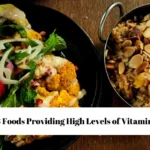Vitamin C is an essential nutrient known for its powerful antioxidant properties and vital role in supporting immune function, skin health, and collagen production. Many people associate vitamin C with citrus fruits like oranges and lemons, but numerous other foods pack a surprising amount of this important vitamin. In this blog post, we’ll explore 13 foods that have the most vitamin C, highlighting their health benefits and how you can easily incorporate them into your diet.
From vibrant bell peppers to tropical fruits like guava and kiwi, these nutrient-dense options not only boost your vitamin C intake but also add delicious flavors and colors to your meals. Read on to discover how you can enhance your health through the power of vitamin C-rich foods.
1. Oranges
Oranges are perhaps the most well-known source of vitamin C. A medium-sized orange contains about 70 mg of vitamin C, which is more than the daily recommended intake for adults. Beyond their vitamin C content, oranges are rich in dietary fiber, antioxidants, and other beneficial nutrients. The high fiber content aids in digestive health, while antioxidants help combat oxidative stress.
Oranges also contain flavonoids, which may have anti-inflammatory properties and support cardiovascular health. Incorporating oranges into your diet can be as simple as enjoying them fresh, juicing them, or adding them to salads for a burst of flavor.
2. Kiwi
Kiwi is a small fruit packed with an impressive amount of vitamin C. Just one medium kiwi contains about 71 mg of vitamin C, making it an excellent choice for those looking to boost their intake. In addition to vitamin C, kiwis are rich in vitamin K, vitamin E, and potassium. The unique combination of vitamins and minerals in kiwis supports immune function and contributes to heart health.
The high fiber content also aids digestion and promotes a healthy gut microbiome. Kiwis can be eaten on their own, added to smoothies, or used as a topping for yogurt or oatmeal, providing a delicious way to increase vitamin C consumption.
3. Strawberries
Strawberries are another delicious source of vitamin C, with one cup containing about 85 mg of the nutrient. Beyond their vitamin C content, strawberries are also rich in manganese, folate, and antioxidants. The presence of anthocyanins in strawberries contributes to their vibrant red color and offers additional health benefits, including reducing inflammation and improving heart health.
Furthermore, the fiber in strawberries helps regulate blood sugar levels and promotes digestive health. Enjoying strawberries can be as simple as snacking on them fresh, blending them into smoothies, or incorporating them into desserts for a nutritious sweet treat.
4. Guava
Guava is a tropical fruit that stands out for its exceptionally high vitamin C content. A single guava can contain over 200 mg of vitamin C, making it one of the richest sources available. Guava is also a good source of dietary fiber, vitamin A, and several antioxidants. The high fiber content helps improve digestive health and may aid in weight management.
Guava’s antioxidants can help protect the body against oxidative stress and inflammation. This versatile fruit can be eaten raw, juiced, or used in salads and salsas, providing a unique flavor and a significant boost of vitamin C.
5. Bell Peppers
Bell peppers, particularly the red variety, are excellent sources of vitamin C. A single cup of chopped red bell pepper can provide approximately 190 mg of vitamin C, which far exceeds the daily recommended intake. In addition to vitamin C, bell peppers are rich in vitamin A, vitamin E, and several antioxidants.
These nutrients support eye health, boost the immune system, and may reduce the risk of chronic diseases. The versatility of bell peppers allows them to be consumed raw in salads, roasted, or stuffed, making them an easy addition to various meals while significantly enhancing vitamin C intake.
6. Broccoli
Broccoli is a nutrient-dense vegetable that offers a substantial amount of vitamin C, with one cup of cooked broccoli providing about 102 mg. In addition to vitamin C, broccoli is a great source of fiber, vitamin K, and folate. The antioxidants found in broccoli, including sulforaphane, are known for their potential anti-cancer properties.
Furthermore, the fiber content aids in digestion and supports heart health. Broccoli can be enjoyed steamed, roasted, or added to stir-fries, making it a versatile addition to a healthy diet while contributing significantly to your vitamin C intake.
7. Papaya
Papaya is a tropical fruit that boasts a high vitamin C content, with one medium papaya containing about 95 mg. In addition to vitamin C, papayas are rich in vitamin A, folate, and dietary fiber. The presence of papain, an enzyme found in papaya, aids digestion and may reduce inflammation.
The combination of nutrients in papaya supports skin health, boosts the immune system, and promotes digestive wellness. Papaya can be enjoyed fresh, blended into smoothies, or added to fruit salads, providing a delicious way to increase your vitamin C intake.
8. Pineapple
Pineapple is not only delicious but also a great source of vitamin C, with one cup providing approximately 79 mg. In addition to vitamin C, pineapple contains bromelain, an enzyme that may help with digestion and reduce inflammation. The fruit is also rich in manganese, which supports bone health and metabolism.
Pineapple can be enjoyed fresh, grilled, or blended into smoothies, making it a versatile ingredient in various dishes. Its sweet and tangy flavor enhances both savory and sweet recipes while contributing to overall vitamin C intake.
9. Brussels Sprouts
Brussels sprouts are a cruciferous vegetable rich in vitamin C, with one cup cooked providing around 97 mg. Along with vitamin C, Brussels sprouts are a good source of fiber, vitamin K, and various antioxidants. The fiber content helps maintain digestive health and may aid in weight management.
Additionally, the antioxidants in Brussels sprouts can help protect against oxidative stress and reduce inflammation. These vegetables can be roasted, steamed, or sautéed, making them a nutritious addition to meals and an excellent way to boost your vitamin C levels.
10. Acerola Cherries
Acerola cherries are exceptionally high in vitamin C, with a single cherry containing about 30-40 mg. This makes them one of the richest sources of vitamin C available. In addition to their vitamin C content, acerola cherries are packed with antioxidants, which help protect the body from oxidative damage.
The high vitamin C content supports immune health and promotes skin health through collagen synthesis. Acerola cherries can be consumed fresh, juiced, or used in supplements, making them a powerful option for those looking to enhance their vitamin C intake.
11. Mango
Mango is a tropical fruit that provides a moderate amount of vitamin C, with one medium mango containing about 60 mg. In addition to vitamin C, mangoes are rich in vitamin A, vitamin E, and various antioxidants. The combination of these nutrients supports immune function, skin health, and vision.
Mangoes are versatile and can be enjoyed fresh, blended into smoothies, or used in salsas and salads, making them a delicious way to incorporate more vitamin C into your diet.
12. Cauliflower
Cauliflower is a cruciferous vegetable that provides a good source of vitamin C, with one cup of cooked cauliflower offering about 50 mg. It is also high in fiber, vitamin K, and folate. The presence of antioxidants in cauliflower contributes to its health benefits, including reducing inflammation and supporting overall health. Cauliflower can be enjoyed steamed, roasted, or riced, making it a versatile addition to a variety of dishes while contributing to your vitamin C intake.
13. Sweet Potatoes
Sweet potatoes are not only a nutritious carbohydrate source but also contain a notable amount of vitamin C, with one medium sweet potato providing about 22 mg. They are also rich in beta-carotene, which the body converts to vitamin A, and provide dietary fiber.
The antioxidants present in sweet potatoes can help combat oxidative stress and support overall health. Sweet potatoes can be baked, mashed, or added to soups and stews, offering a delicious way to incorporate more vitamin C and other essential nutrients into your diet.
Conclusion
Incorporating these 13 foods that have the most vitamin C into your diet can significantly enhance your overall health and well-being. From citrus fruits to leafy greens, each option offers unique benefits that go beyond just vitamin C.
By diversifying your intake, you can support your immune system, improve skin health, and boost your antioxidant defenses. Start experimenting with these foods today to enjoy their delicious flavors and reap the numerous health benefits they provide.
FAQs
Q: What is the best source of vitamin C?
A: Some of the best sources of vitamin C include guava, bell peppers, and kiwi, with guava containing the highest concentration.
Q: How can I increase my vitamin C intake?
A: You can increase your vitamin C intake by incorporating a variety of fruits and vegetables like oranges, strawberries, and broccoli into your meals and snacks.




